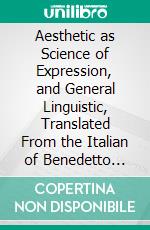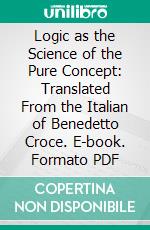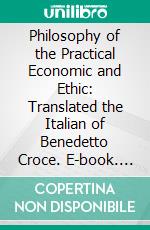Douglas Ainslie eBooks
eBooks di Douglas Ainslie
Aesthetic as Science of Expression, and General Linguistic, Translated From the Italian of Benedetto Croce. E-book. Formato PDF Douglas Ainslie - Forgotten Books, 2017 -
Least disposed to contemplate and to theorize: their energy is not delayed in contemplation, it rushes at once into will. And conversely, that contemplative men, philosophers, are often very mediocre in practical matters, weak willed, and therefore neglected and thrust aside in the tumult.
Logic as the Science of the Pure Concept: Translated From the Italian of Benedetto Croce. E-book. Formato PDF Douglas Ainslie - Forgotten Books, 2017 -
Benedetto Croce was a philosopher, humanist and historian who made his mark on 20th Century philosophy by publishing La Critica, which was for 40 years the most significant literary and cultural journal of Europe, published bi-monthly. Logic As the Science of the Pure Concept is possibly one of his most important contribution to philosophy. Croce was influenced by Hegel and German Romanticism of the 19th Century and he developed a philosophy that centred on "the spirit," or human consciousness, as the only reality.In expanding on these theories, Logic As the Science of the Pure Concept is divided into four parts; Part I defines "pure concept" and "pseudo-concept," as well as individual judgment and logic; Part II is about the distinctions and purposes of philosophy, history, and natural and practical mathematical sciences; Part III is about error and its necessary forms; and Part IV explains the relationship between history and philosophy. Croce maintained that pure concepts are ideas which are universal. Human action is oriented towards one of the four aspects of spirit, the Beautiful, the True, the Useful, and the Good. Things Beautiful and True are those touching on spirit, intuition and logic. The Useful and the Good are linked with practical matters, like economics and ethics. In Croce's view, metaphysics and sciences are pseudo-concepts; they are fictitious and not drawn from practical experience.In the fascinating fourth part of the book, Croce discusses the nature of history. History, in Croce's conception, is the story of liberty, a story which unfolds through individuals. For Croce, philosophy is the methodology of studying and ordering history. Croce's philosophies are neither theoretical nor abstract as they are mostly developed from a pragmatic assessment of history. Those interested in philosophical puzzles, logic and reasoning will enjoy Logic As the Science of the Pure Concept and its novel theories on science, history and philosophy.
Philosophy of the Practical Economic and Ethic: Translated the Italian of Benedetto Croce. E-book. Formato PDF Douglas Ainslie - Forgotten Books, 2017 -
Practical will, I think, find that none of Bergson's explanations, burdened, as he says, with geo metry, and as we may say with matter, from the obsession of which he never seems to shake him self altogether free, are comparable in depth or lucidity with the present treatise. The spirit is described by Bergson as memory, and matter as a succession of images. How does the one communicate with the other? The formula of the self-creative life process seems hardly sufficient to explain this, for if with Bergson we conceive of life as a torrent, there must be some reason why it should ?ow rather in one channel than in another. But life is supposed to create and to absorb matter in its progress; and here we seem to have entered a vicious circle, for the intuition presupposes, it does not create its object. As regards the will, too, the Bergsonian theory of the Ego as rarely (sometimes never once in life) fully manifesting itself, and our minor actions as under the control of matter, seems to lead to a deterministic conception and to be at variance with the thesis of the self-creation of life.


